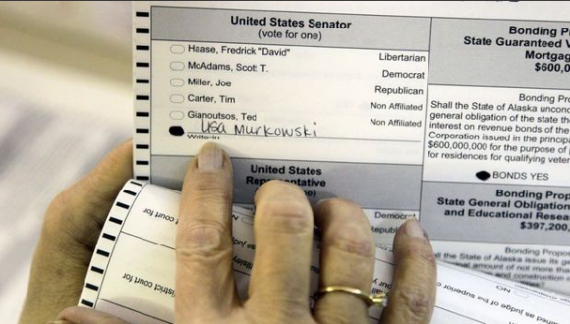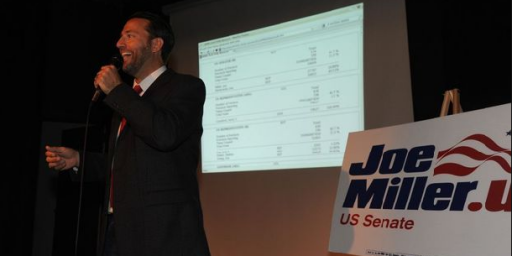Murkowski Continues To Lead In Write-In Count, Miller Camp Grows More Desperate
As the counting of write-in ballots in Alaska continues to go in Lisa Murkowski's favor, the Miller campaign is getting more desperate in its ballot challenges.
At the conclusion of the second day of write-in ballot counting in Alaska, the votes for Lisa Murkowski continues to grow:
The Division of Elections has reviewed write-in ballots for almost half the precincts in Alaska and is counting nearly 98 percent of them for Lisa Murkowski. The Murkowski campaign is acting confident of victory and is accusing Joe Miller of taking “desperate” measures to try to win.
The state Thursday finished its second day of going through the write-in ballots in Juneau. More than 45,000 of them have been reviewed so far. Counting resumes this morning and is expected to continue through the weekend.
The Murkowski campaign said “it couldn’t be going any better” and that the Miller campaign has resorted to challenging perfectly spelled ballots.
“It’s an act of desperation,” said Anchorage ad executive John Tracy, part of the Murkowski campaign’s ballot-count-monitoring team. “Really the only thing that seems clear is that they’re trying to pump up their challenged ballot numbers.”
Examples were not hard to find of Miller observers challenging Murkowski ballots that were spelled accurately and looked to be filled out properly. More often, the challenged ballots had a letter misspelled in Murkowski’s last name or the word “Republican” written on the ballot next to it.
Miller spokesman Randy DeSoto said he couldn’t comment on the individual judgments made by his candidate’s ballot observers. But he said the campaign isn’t out to challenge straightforward votes. He said the Miller camp’s aim is to challenge misspelled ballots, those with legibility issues, that are filled in wrong, or otherwise open to question.
(…)
It appears as though Miller needs to keep about 12 percent of the write-ins from going for Murkowski. The count has been steady over the past two days, with more than 89 percent of the reviewed write-in votes going unchallenged for Murkowski, slightly more than the absolute minimum she would need.
As of right now, the unofficial results show “Lisa Murkowski” with 40,518 of the 45,132 write-in votes counting. Two other variations of Murkowski’s name — which appear to be instances where the person wrote in only her last name — have 4,294 (8%) of the vote so far. If this continues, it seems next to impossible for Miller to have the requisite number of challenges to allow his lawsuit to have any merit.
Over at Ace of Spades HQ, Gabriel Mailor takes a look at some of the more ridiculous Miller challenges, and makes this note about the most-discussed Alaska law which many are claiming requires absolutely exact spelling by a person casting a write-in vote:
State-law imposed burdens on the right to vote can be constitutional in many circumstances, but the court will weigh the injury to the right to vote against the interest asserted by the state. What interest will be asserted in favor of the exact-spelling rule? Accuracy in counting is undoubtedly an important public interest and it weighs heavily against the exact-spelling rule. Disfranchisement (and thus, inaccuracy) is the crux of the injury here. That’s an substantial injury, probably requiring strict scrutiny of the law. The only other state interest I can see is uniformity, but I doubt that will outweigh the injury. After all, uniformly throwing out all write-in votes would clearly not be a constitutional burden on the right to vote. Uniformity alone can’t get you there. Not in the face of voter disfranchisement.
Moreover, the Alaska Supreme Court has a lengthy line of cases holding that “the crucial question in determining the validity of ballot markings is one of voter intent.” For example, the statute requires that the bubble be completely filled in. But that hasn’t stopped the Alaska courts in the past from using the principle that voter intent is constitutionally protected to count votes in which the bubble is partially filled.
In short, the right to vote and to have one’s vote counted will be weighed against the exact-spelling rule. I can’t think of any interests that will weigh heavier than complete disfranchisement for a mere slip of a pen. And so I expect the courts will not side with Miller, but with the Division of Elections. After all, knocking down literacy tests for voting was a pretty big deal at one time.
So under Alaska case law interpreting the statute under which Miller is suing, it would seem clear that exact spelling is most emphatically not required. Miller, however, has another problem in that it appears that he may have filed suit in the wrong Court:
The state says that Republican U.S. Senate candidate Joe Miller has no business going into federal court now to challenge the counting of write-in ballots for his opponent and urged a federal judge to dismiss the case he filed this week.
State courts are the proper forum to interpret Alaska election law and the actions of state officials, Assistant Attorney General Margaret Paton Walsh said in her motion to dismiss. Until the Alaska Supreme Court has spoken, Miller has no legal basis to make a federal case out of the issue, she said.
“The plaintiff (Miller) in this case has attempted to dress his state-law claims in federal-question clothing, in order to go forum shopping,” Paton Walsh wrote. “The Alaska Court System is the proper forum for this case. The Alaska Supreme Court is very familiar with the state’s election laws — issuing an election law decision as recently as two weeks ago — and is the appropriate court to interpret Alaska’s election statutes.”
Miller’s decision to file in Federal rather than State court is likely driven by the fact that his attorneys think that they’d have a better chance before a Federal District Court Judge. Of course, even if the Federal Court did decide to hear the case it would still be required to apply Alaska law on the ballot counting issues, including the Alaska Supreme Court precedents noted above. However, Miller’s lawyers are obviously gambling on the idea that a Federal judge would be less lenient in this regard than a State trial court judge. Based on my own experiences in Federal Courts here in Virginia, though, I would suspect that the most likely outcome is that the District Court Judge will refused to exercise jurisdiction over the case since it involves primarily issues of state law. It’s worth noting, for example, that Bush v. Gore started out as a lawsuit in state court in Florida challenging the ballot count in Palm Beach County.
One final note from the Anchorage Daily News strikes me as a further sign that the Miller campaign is becoming more desperate as the ballot count continues to go in Murkowski’s favor. For reasons I cannot quite understand, they’ve signed on a guy who has a reputation as a sleaze merchant:
Floyd Brown, the man responsible for the “Willie Horton” television ad that helped derail the Michael Dukakis presidential campaign in 1988, has signed up for the Joe Miller campaign.
Brown is here in Juneau Thursday for the write-in ballot review and has called a 4 p.m. press conference to discuss “the direction of the Miller campaign heading into the weekend.”
What direction that might be I can only imagine.
UPDATE (James Joyner): Election law expert Richard Hasen takes a generous view of Miller’s shenanigans in a Slate piece titled “Alaska’s Big Spelling Test: How strong is Joe Miller’s argument against the Leeza Markovsky vote?” Essentially, Miller’s team is doing its due diligence. But he thinks the outcome pretty clear:
Whether the statute requires proper spelling is a difficult question of statutory interpretation. The reason that Alaska election officials said it did not, and instead adopted the looser standard of “voter intent,” which allows for misspellings, is the Alaska Supreme Court’s long-standing use of a rule of interpretation which reads ambiguous statutes in favor of the voters. (I’ve dubbed this rule the Democracy Canon.) In this case, throwing out minor misspellings would disenfranchise voters for a technicality. I’ve traced use of the voter intent standard in state courts back to 1885, and Alaska has a particularly strong version of it. The state’s courts say that election statutes must be read in favor of allowing votes to be counted unless the legislature has made it unmistakably clear not to read a law this way.
[…]
As a matter of fairness, the rules for running an election should not be changed mid-stream. To do so not only upsets expectations; it also reeks of lawlessness and raises the possibility of manipulation by the people making the rules up as they go along. Changing the rules for counting write-ins could violate due process protections against arbitrary and disparate treatment by the government. So the question now in Alaska is whether the rules for counting the misspelled ballots actually differ from the handling of write-ins in the past, or are simply reasonable ways of implementing the existing statute. It’s in line with Alaska’s election law history for election officials to count some misspelled ballots for Murkowski. Her tricky last name won’t be the reason she loses this election. As it shouldn’t be.
Photo: Anchorage Daily News






Many of Miller’s challenges seem ridiculously desperate. And I agree that votes that are rather clearly intended to be for Lisa Murkowski but have some minor misspelling should and almost certainly will count — if they’re even needed.
That said, the “literacy test” argument is silly. Election officials used to “test” the “literacy” of voters as a prerequisite to vote and used it as a device for denying blacks the franchise. Obviously, neither of those things is happening here. And I don’t know how one can engage in a write-in vote without some minimal degree of literacy. Surely “X” or a drawing of Lisa Murkowski wouldn’t count.
Yea I think calling it a “literacy test” is probably a little too much poetic license, but the point remains that it seems unlikely that someone who got Murkowski’s name off by one or even two letters is going to be deprived of having their vote counted.
I haven’t read the Alaska Supreme Court cases Mallor cites in the section I quoted but the “voter intent” standard is fairly universal from state-to-state. The question becomes how generous one becomes in applying that standard — which is what the issue ultimately was in Bush v. Gore
If nothing else, the 8% of the votes that put down her last name and spelled it correctly should count. If Miller makes the argument that it could be some other Murkowski, voter intent should be examined. Taking it a step farther, if there is another person in Alaska named “Lisa Murkowski”, Miller could argue that even the correctly spelled ones should be thrown out because maybe those people were voting for the other Murkowski.
There is a real hypocrisy in that Joe Miller was apoplectic that Murkowski wouldn’t accept the clear will of the Republican primary voters and now is doing everything in his power to void the clear intent of the general election primary voters.
FWIW, I wouldn’t count the ones that said “Murkowski – Republican” because it isn’t clear if the voter intended to vote for Murkowski or the Republican candidate (Miller).
MarkedMan,
And I think that, in the end, that’s where this will come out.
Like I said, the idea of respecting “voter intent” is a pretty universal one in the US regardless of how strict the standards set in the statute are. Courts are very reluctant to throw out someone’s vote because they made a mistake
Some of the challenged ballots don’t even appear misspelled. Miller apparently wants a ‘no bad handwriting’ standard.
Tea party hypocrisy on parade-
“the federal government over reaches into matters that are exclusively the realm of the states…wait, I’d *lose* in state court? I wanna federal court hearing immediately!”
Tool.
John Tracy, the guy who helped force Dan Fagan off the air the other day, the Alaskan Supreme Court, much like the Florida one ten years ago, is a rogue court, hope Miller can find a Judge
Saul somewhere in the mix